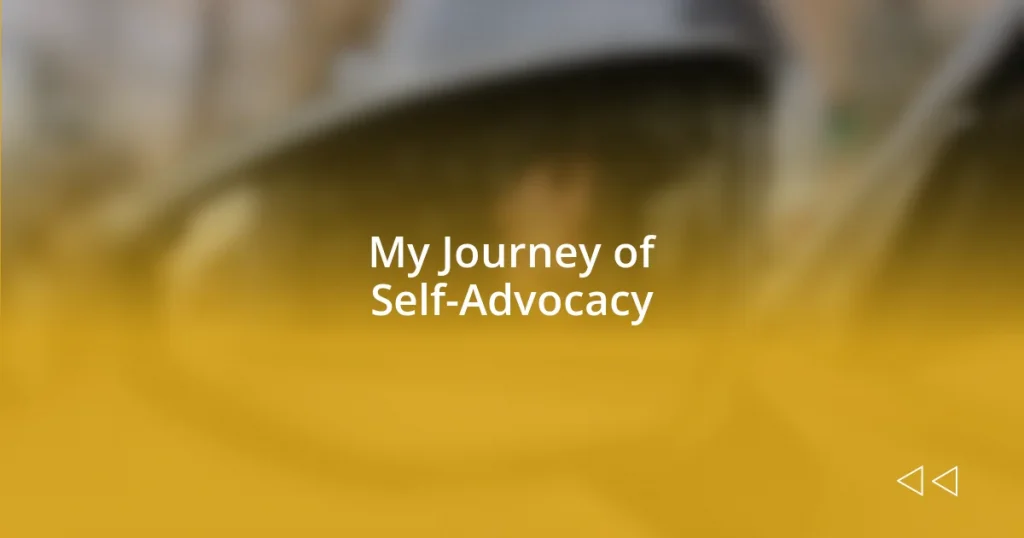Key takeaways:
- Self-advocacy empowers individuals to recognize their needs, articulate them confidently, and seek support, enhancing both personal well-being and relationships.
- Identifying personal strengths and setting clear, prioritized goals for self-advocacy help individuals effectively navigate challenges and maintain focus on their objectives.
- Encouraging others to advocate for themselves fosters a supportive community where shared experiences and successes inspire collective empowerment and personal growth.

Understanding Self-Advocacy Importance
Understanding self-advocacy is crucial because it empowers us to take charge of our own needs and rights. I remember the first time I stood up for myself at work; it felt daunting, but claiming my space made me realize how much my voice mattered. Have you ever found yourself in a situation where you felt unheard? It can be a disheartening experience, yet that discomfort can fuel the motivation to speak out.
The importance of self-advocacy also extends to our mental health; it’s about acknowledging our worth and seeking help when we need it. I once hesitated to express my struggles to a friend, fearing judgment, but when I finally did, I discovered a deeper connection and support. Isn’t it liberating to know that by speaking up, we can foster not only our well-being but also strengthen our relationships?
Furthermore, self-advocacy teaches us resilience. There was a point in my life where I faced numerous rejections while pursuing my goals. Each time, I took a moment to reflect on what I wanted and learned to articulate that vision clearly. It’s a transformative process—each failure became a stepping stone prompting me to refine my message. How many times have you redefined your approach after a setback? Embracing this journey cultivates an unwavering belief in yourself.

Identifying Personal Strengths and Needs
Identifying personal strengths and needs is a crucial step in advocating for ourselves. I’ve often found that reflecting on my accomplishments helps me realize what I’m truly good at—and sometimes, it surprises me. For instance, I used to think my ability to empathize was a given, but over time, I’ve learned that it’s not only a strength but also a unique asset in my interactions. Understanding these qualities empowers me to better articulate what I need from others and the environment around me.
To effectively identify these strengths and needs, I’ve developed a simple method:
- Reflect on past experiences: What moments made me feel proud or fulfilled?
- Seek feedback: Conversations with friends or colleagues can illuminate strengths I may overlook.
- List needs: Consider what environments or support systems enable my best performance.
- Prioritize goals: Determine what I want to achieve and assess how my strengths align with those objectives.
By taking this thoughtful approach, I enable myself to advocate for what I truly need to succeed, fostering a sense of agency in my personal and professional life.

Setting Goals for Self-Advocacy
Setting clear goals for self-advocacy can provide a focused direction on this empowering journey. I typically start by defining what success looks like for me. For example, when I wanted to negotiate a raise, I set a specific dollar amount and a timeline. This clarity helped me prepare my case and articulate my value in a way that felt authentic and assertive.
Next, I prioritize my goals based on urgency and relevance. I once had a series of objectives, and I’ve learned that spreading myself too thin led to burnout. Instead, focusing on one primary goal at a time—like improving communication with my supervisor—allowed me to devote my energy effectively. It’s amazing how much progress you can achieve when you don’t feel overwhelmed!
Finally, I believe in the power of reflection. After pursuing a goal, I often take time to revisit the outcome. Did I communicate effectively? What could I improve next time? This process not only hones my advocacy skills but also reinforces my personal growth. Have you ever taken a moment to reflect on your outcomes? That pause can reveal invaluable lessons.
| Short Term Goals | Long Term Goals |
|---|---|
| Improve communication with colleagues | Develop leadership skills |
| Request feedback on a project | Secure a promotion within two years |
| Practice saying no to unreasonable requests | Create a personal brand |

Developing Effective Communication Skills
Developing Effective Communication Skills
To me, effective communication isn’t just about speaking clearly; it’s about conveying my thoughts with confidence. I remember a time when I had to present my ideas in a meeting with senior management. My hands were shaking, and my voice wavered at first, but I focused on breathing and visualizing a positive outcome. This strategy helped me deliver my message more effectively, and the feedback I received was empowering. How often do you think we overlook the power of our body language in those high-stakes moments?
Listening is another critical aspect I’ve learned in my journey. There was a point when I proudly shared my opinions without fully grasping others’ perspectives. It took a mentor’s gentle nudge for me to realize that true communication involves a two-way street. Now, when someone speaks, I actively listen, nodding and asking questions. This approach not only deepens my understanding but also fosters a more collaborative environment. Have you noticed how people respond positively when they feel genuinely heard?
I’ve also discovered the value of adapting my communication style to different audiences. In casual conversations with friends, a relaxed tone works wonders, while in professional settings, clarity becomes paramount. For instance, when discussing project updates with my team, I offer concise bullet points to keep everyone focused. It’s fascinating how adjusting my approach can lead to more productive discussions. Have you ever tried changing your tone or style to suit your audience? It can truly transform interactions!

Navigating Challenges in Self-Advocacy
One significant challenge I’ve faced in self-advocacy is the fear of judgment. I vividly remember a time when I hesitated to voice my opinion during a team meeting. My heart raced, and I couldn’t help but worry about how others would perceive me. But then, I decided to lean into that discomfort by reminding myself that my perspective is valuable. Has there ever been a moment when you held back because of fear? Overcoming that fear is often the first step toward self-advocacy.
Another hurdle I navigated was figuring out how to articulate my needs without sounding demanding. I found myself in a situation where I needed to request additional resources for a project. Initially, I approached the conversation as if I were asking for a favor, instead of advocating for what was necessary to succeed. I learned that framing it around the project’s impact created a collaborative rather than a confrontational atmosphere. When do you think the way we word our requests can change the outcome? I now focus on using inclusive language, emphasizing teamwork and shared goals, and it makes a world of difference.
Lastly, I’ve encountered challenges in recognizing and addressing my own limits. Early in my advocacy journey, I had the tendency to take on too much, thinking that it would prove my commitment. It took a few burnout moments for me to realize that self-advocacy includes self-care. I’ve started to set boundaries that protect my time and mental health, like saying no to tasks that don’t align with my primary goals. Isn’t it fascinating how empowering it can be to prioritize our well-being? I genuinely believe that setting these limits not only benefits me but also enhances my ability to advocate for others.

Sharing My Success Stories
Sharing my success stories in self-advocacy is an exhilarating experience that highlights the progress I’ve made. A memorable moment for me was when I secured a key sponsorship for my project at work. I had to pitch my ideas to a panel, and despite my nerves, I leaned into my passion for the project. When the decision came through, the sheer joy I felt was overwhelming. Have you ever had that rush when your hard work pays off?
I also recall a time when I successfully negotiated a flexible work arrangement. It required me to be transparent about my needs while emphasizing the benefits for the team. I crafted my message carefully, focusing on how this change could improve my productivity. When my manager agreed, a weight was lifted off my shoulders, leaving me reflecting on the importance of perceiving such conversations as partnerships rather than confrontations. What has been your most rewarding negotiation experience?
One of the most fulfilling aspects of my journey has been mentoring others who are navigating their self-advocacy paths. I remember guiding a colleague through a tough conversation where they needed to address their workload issues. Witnessing their confidence grow as they articulated their needs was incredibly rewarding. It made me realize that sharing our successes not only reinforces our own achievements but also empowers others to embark on their advocacy journeys. Have you ever considered how your victories could inspire someone else?

Encouraging Others to Advocate
Encouraging others to advocate for themselves can be one of the most impactful things we do. I remember talking to a friend who felt unheard in her workplace. I shared my own experiences with self-advocacy, explaining how small steps can lead to big changes. When I encouraged her to start voicing her thoughts during team discussions, the look of determination on her face was priceless. Have you ever watched someone light up when they realize their voice matters?
One powerful way to inspire advocacy is to create a supportive environment. I often remind individuals that their feelings and needs are valid. Once, I facilitated a workshop where participants openly discussed their challenges. The room was filled with vulnerability, and it was amazing how everyone began to share their own situations. It became a domino effect—one story encouraged another. Isn’t it fascinating how sharing our struggles can create a sense of community?
Additionally, leading by example is essential in fostering this mindset. I’ve found that openly celebrating even minor wins can motivate others. Like the time I successfully advocated for a team-wide lunch break to recharge. I made sure to highlight how it improved our focus and collaboration. Witnessing my colleagues embrace the idea and advocate for similar changes felt like a victory for all of us. Has there been a moment when you’ve seen someone transform into a self-advocate simply because your journey inspired them?















